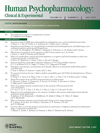Effectiveness of aripiprazole in the treatment of adult Tourette patients up to 56 months
Abstract
Objective
Tourette Syndrome (TS) is characterized by motor and vocal tics. Its pharmacological treatment is often a challenge because of the so-called tachyphylactic effects. Aripiprazole has been reported to be effective in small case series with short follow-up periods.
Methods
In a retrospective analysis, we assessed the effect of off-label treatments with aripiprazole in 20 adult patients (mean age 27.4) divided in a group of severely [67 Yale Global Tourette Severity Scale (YGTTS)-total] and moderately (43.3 YGTTS-total) affected patients. TS patients were treated with aripiprazole (mean 11.8 mg daily) and followed for up to 56 months.
Results
Applying a random coefficient model, we found a significant benefit resulting from treatment with aripiprazole. This effect was larger in the severely affected patient group in comparison with the moderately affected patient group. The effect was stable over a time period up to 56 months.
Conclusion
Aripiprazole, a neuroleptic drug of the third generation with a partial D2-agonism is effective in moderately and severely affected adult Tourette patients. We add to the current knowledge through our data extending the follow-up interval up to a maximum of 56 months. All available clinical data strongly support the initiation of a double-blind placebo or other neuroleptic substance controlled trial. Copyright © 2012 John Wiley & Sons, Ltd.




